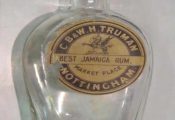Rum was one of the products manufactured on the plantations of the West Indies by slave labour. Rum was distilled as a by-product of sugar cane grown in the fields after the sugar was largely extracted. It was sold in exchange for newly trafficked captives from Africa or supplied by traders in the ports of the Caribbean. The casks would then be shipped to England for consumption and a profit, as part of the final leg of the triangular trade journey. It was said that the British Navy ran on rum as each sailor had a generous daily allowance. Rum was sometimes given to the enslaved during the Atlantic crossing to pacify them.
© Hull Museums



